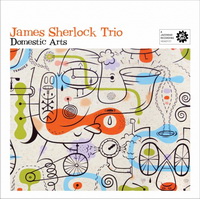Home » Jazz Articles » Album Review » James Sherlock Trio: Domestic Arts
James Sherlock Trio: Domestic Arts
"Domestic Arts and Sciences"—one of two tracks which appeared on Solo—is given a set of powerful lungs by the impetus of double-bassist Brendan Clarke and drummer Tim Firth. Clarke's swinging bass provides the platform from which Sherlock launches into a solo, where rapid runs of tremendous fluidity are punctuated by rhythmically chopped chords. Firth, with his constant ride cymbal and punchy groove accented with plenty of little bombs and fills, brings personal dynamism to one of the CD's standout tracks.
Solo liberally mined the Great American Songbook, but here the trio limits itself to Cole Porter's eternally popular "You'd Be So Nice to Come Home To." The rhythm section, driven by Firth's crisp rim shots, swings hard, leaving the heavy lifting to Sherlock, whose expansive solo flirts with the melody. Clark takes a solo which breaks things up before the leader picks up the reins and drives the melody home with imaginative embellishment.
This is essentially a swing trio and it works some magic on Bud Powell's "Celia" and Thelonious Monk's tuneful "We See." Rather than attempt to emulate mimic Monk's highly personal style, a trap into which many are lured, Sherlock sticks to his guns and carves out another wonderful solo where his own vocabulary tells Monk's story. The trio glides gracefully through Antonio Carlos Jobim's "Luiza," respecting the melody and capturing the intense lyricism of the song, though Sherlock's Hancock custom archtop brings bite to the arrangement.
Sherlock is once again seduced, as he was on Solo, by Hugh Cornwell's "Golden Brown;" Clarke weaves a brief but melodic bass solo, but the tune really comes to life when the trio shift up a gear led by Sherlock's fleet attack. The architecture and detail of Sherlock's previously recorded solo rendition of the same tune is more striking, though admittedly this may be comparing apples to oranges. Sherlock's "Rock March" is a straight-ahead number which jumps out of the blocks in lively manner, as Firth and then Sherlock take protagonism in a strong closing statement.
Domestic Arts is a fine trio recording which rekindles the flames of old-school guitar-led jazz combos. There is, however, little that is nostalgic about Sherlock's playing; his highly personal voice and outstanding technique bring a truly contemporary edge to old tunes. Sherlock is already a well-known figure on the Australian jazz scene, but this engaging release is worthy of opening doors to a much wider audience
Track Listing
Domestic Arts and Sciences;Celia; Golden Brown; You'd Be So Nice to Come Home To; Luiza; We See; Rock March.
Personnel
James Sherlock
guitarJames Sherlock: guitar; Brendan Clarke: double-bass; Tim Firth: drums.
Album information
Title: Domestic Arts | Year Released: 2011 | Record Label: Jazzhead (Australia)
< Previous
Letter to Herbie
Comments
Tags
For the Love of Jazz
 All About Jazz has been a pillar of jazz since 1995, championing it as an art form and, more importantly, supporting the musicians who create it. Our enduring commitment has made "AAJ" one of the most culturally important websites of its kind, read by hundreds of thousands of fans, musicians and industry figures every month.
All About Jazz has been a pillar of jazz since 1995, championing it as an art form and, more importantly, supporting the musicians who create it. Our enduring commitment has made "AAJ" one of the most culturally important websites of its kind, read by hundreds of thousands of fans, musicians and industry figures every month.




















